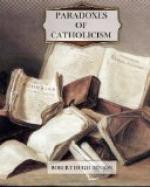Once more, then, the double charge is brought. We believe, it seems, where we ought to reason. We reason where we ought to believe. We believe too blindly and not blindly enough. We reason too closely and not closely enough.
Here, then, is a vast subject—the relations of Faith and Reason and the place of each in man’s attitude towards Truth. It is, of course, possible only to glance at these things in outline.
II. First, let us consider, as a kind of illustration, the relations of these things in ordinary human science. Neither Faith nor Reason will, of course, be precisely the same as in supernatural matters; yet there will be a sufficient parallel for our purpose.
A scientist, let us say, proposes to make observations upon the structure of a fly’s leg. He catches his fly, dissects, prepares, places it in his microscope, observes, and records. Now here, it would seem, is Pure Science at its purest and Reason in its most reasonable aspect. Yet the acts of faith in this very simple process are, if we consider closely, simply numberless. The scientist must make acts of faith, certainly reasonable acts, yet none the less of faith, for all that: first, that his fly is not a freak of nature; next, that his lens is symmetrically ground; then that his observation is adequate; then that his memory has not played him false between his observing and his recording that which he has seen. These acts are so reasonable that we forget that they are acts of faith. They are justified by reason before they are made, and they are usually, though not invariably, verified by Reason afterwards. Yet they are, in their essence, Faith and not Reason.
So, too, when a child learns a foreign language. Reason justifies him in making one act of faith that his teacher is competent, another that his grammar is correct, a third that he hears and sees and understands correctly the information given him, a fourth that such a language actually exists. And when he visits France afterwards he can, within limits, again verify by his reason the acts of faith which he has previously made. Yet none the less they were acts of faith, though they were reasonable. In a word, then, no acquirement of or progress in any branch of human knowledge is possible without the exercise of faith. I cannot walk downstairs in the dark without at least as many acts of faith as there are steps in the staircase. Society could not hold together another day if mutual faith were wholly wanting among its units. Certainly we use reason first to justify our faith, and we reason later to verify




